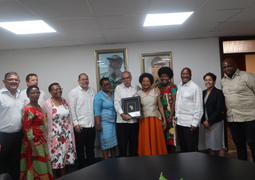
Parliament, Wednesday 19 September 2018 – On the second day of their five-day international engagement program in Cuba, the high-level South African Parliament delegation, including Chief Whips and led by Speaker Ms Baleka Mbete, held insightful deliberations with Ministry of Public Health representatives and Head of National Academic Training Dr Jorge Gonzalez. Cuba boasts one of the most successful primary health care systems in the world and trains thousands of doctors from 121 countries annually. South Africa is one of these.
Dr Gonzalez urged the South African Parliament to ensure South Africa’s health care sector embraced the role and concept of family health care. Medical students from South Africa, currently studying in Cuba, are being trained in family health care. He told the delegation that one of the biggest concerns South African students had was what would happen when they returned to South Africa? This is because the calibre of primary health care and family-based health care concept they were trained in was totally different to that being practiced in South Africa. This made it difficult for them to fit in. Dr Gonzalez said it was not easy for Cuba to transform its health care system when President Fidel Castro called for it to be put in place decades ago.
Today, however, Cuba has the highest life expectancy and the lowest mortality rates in the world – surpassing even economic superpowers, such as, the United States of America (USA). Cuba has suffered the USA economic embargo for over six decades. It has cost Cuba’s economy more than $130 billion. Despite the devastating economic hardship on its 11 million people, Cuba has established a family-based health care system centered on transformation and humanism, which promotes prevention and education. This system, which many countries are emulating, is part of Cuba’s medical training curriculum.
Dr Gonzalez said the system, among other things, entails deploying doctors and nurses in rural communities and its family-oriented nature includes regular family visits. Doctors continually advise on healthy lifestyles and assess health care needs of communities – to ensure ongoing improvement of medical service. It is one of the best examples of personalised family medicine, which ensures each family has its own family doctor and primary care nurse team who visit them regularly at home.
More than half of Cuban doctors are family doctors. There is one doctor for every 122 families – about 8 doctors per 1 000 people.
Said Speaker Mbete: “We are humbled by the remarkable success of this sister country’s family medicine system, which has turned Cuba into the envy of the world. There’s already an arrangement and discussion for our portfolio committees on health and sports to come and study your successes to ensure they are integrated in the oversight agenda of Parliament. This will, indeed, assist in ensuring that we create a more conducive atmosphere for our students when they return home so that they apply their knowledge and training to take our health system forward.”
Speaker Mbete thanked the government representatives for Cuba’s partnership with South Africa in the area of public health care.
Parliament’s delegation also visited Cuba’s Genetic Engineering and Biotechnology Centre, which among other things, is responsible for producing a significant percentage of Cuba’s own medicine. The Centre also partners South Africa on the hepatitis B vaccine.
Today, the delegation will hold a bilateral meeting with the President of Cuba’s National Assembly of People’s Power and attend a wreath laying ceremony in honour of Jose Martí, hero of the Republic of Cuba.
ISSUED BY THE PARLIAMENT OF THE REPUBLIC OF SOUTH AFRICA
Enquiries: Moloto Mothapo

